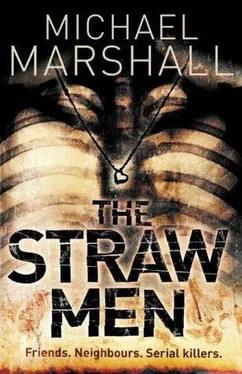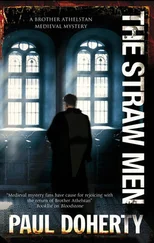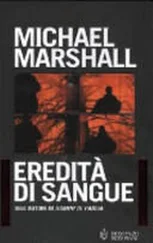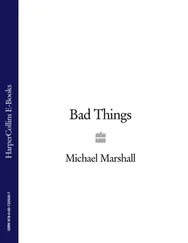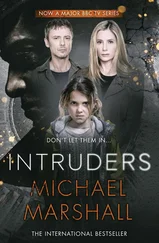Michael Marshall
The Straw Men
We are too late for gods and too early for Being. Being's a poem, Just begun, is man. Martin Heidegger Language, Truth, Thought Translated by Albert Hofstadter
Palmerston, Pennsylvania
Palmerston is not a big town, nor one that can convincingly be said to be at the top of its game. It's just there, like a mark on the sidewalk. Like all towns, it has a past and once had a future, but in this case that future turned out to involve little but getting dustier and more sedate, nudged ever further from the through lines of history: a stiff old faucet at the end of an increasingly rusty pipe, that someday is going to leak so badly that no water makes it to the end at all.
The town sits on the Allegheny River, in the shade of muscular hills, and has more trees than you could shake a stick at unless you had a lot of time and were unusually demented. The railroad used to pass close by, just the other side of the river, but in the mid 70s the station was closed and most of the track lifted up. Little remains of it now apart from the memory and a half-hearted museum, which not even the schoolkids visit much any more. Every now and then a few tourists will wander in, peer with bemused indifference at grim photographs of the long-dead, and then elect to get back in the car and make time. Though it's been thirty years, long-term residents (and in Palmerston, they're all long-term, and vaguely proud of it) still feel the absence of the railroad, like an amputated limb that itches from time to time. For some there were petitions and town meetings, bumper stickers and fundraisers; for others the change came quietly, numbly accepted as part of history's entropic progress in some other direction. Were the town a little bigger and more boisterous, the overgrown track might make a good place to buy drugs or get mugged. In Palmerston it's used mainly by earnest parents to trek children down at weekends, for pointing at birds and trees; and equally earnestly, a few years down the line, for those same kids to get each other pregnant in order to exchange one style of confinement for another.
The town is built around a T junction, the shape of the letter obscured by side streets that seem unsure of their purpose. The upright is littered with gas stations, a car wash, a video store, two small motels and a minimart with a rack of cheap CDs of the Marshall Tucker Band's Greatest Hits. An old wooden church stands at the intersection with the cross stroke, paint peeling now, but still picturesque against a cold blue sky. The right fork takes you up into the hills towards New York State and the Great Lakes.
If you take a left, as you would if you were heading west on Route 6 to go look at the Allegheny reservoir — and. that's pretty much the only reason that you'd be passing through — you get onto Main Street. Here you find a few banks and stores, the windows of the former mirrored and anonymous; those of the latter in need of cleaning, and framing antiques of limited worth. Something about the desultory arrangement of the displays suggests that the objects will have plenty more time to accrue value in situ. There are two small movie houses, one of which tried to show art movies ten years ago and was rewarded by attendances so low that it closed in a fit of pique and never reopened; the other still steadfastly toeing the party line of popular culture, hawking unrealizable dreams to popcorn junkies. On the southern side of the street, in a large plot all by itself, sits a beautiful Victorian house. It has lain empty for some years, and though most of the windows are intact, it's peeling a good deal worse than the church and some of the boards are beginning to slip.
If you're hungry, chances are you'll find yourself in the McDonald's a little further up the street, just along from the Railway Museum. Most people do. Palmerston isn't a bad place. It's peaceful, and the people are friendly. It's a pleasant part of the world, low on crime and close by the Susquehannock State Forest. You could be born, raise kids, and die there, without feeling you'd been especially short-changed by fate.
There just isn't much to do in between.
* * *
At lunchtime on Wednesday, 30th October 1991, the McD's was crowded. Most of the tables were already occupied, and four lines straggled out from the counter. Two little girls, four and six years old and out for a treat with their mother, clamoured vehemently for Chicken McNuggets. Everyone else gazed at the menu boards with the reverence they deserved.
There were three non-locals present, a red-letter day for Palmerston's tourist industry. One was a middle-aged man wearing a suit, sitting by himself at a table in the corner. His name was Pete Harris, and he was driving back to Chicago after a long sales trip that had been largely disappointing. The Victorian house's Italianate tower was just visible from his seat and he was considering the house as he chewed, finding it astounding that no one had bothered to reclaim the property and fix it up.
The other two were a couple of English tourists, by coincidence sitting at the next table. Mark and Suzy Campbell had skipped breakfast to do a couple hundred miles in the morning and were more than ready for some food. They'd been hoping for a picturesque diner, but after a slow trawl through town they'd settled on the burger den by default. Munching their sandwiches in a defensive huddle, they were at first alarmed and then mildly pleased to find that they had sat next to a local who talked. His name was Trent, and he was tall, in his forties, and had a good deal of copper-coloured hair. On hearing that they were a few days into a coast-to-coast drive, he nodded with distant approval — as if being told of a practice he could understand but had no desire to undertake himself, like collecting matchbooks, or rockclimbing, or having a job. He was familiar with England as a concept, and gathered that it had a whole lot of history and a thriving rock music industry, both of which he was in favour of.
In the end the conversation petered out, running aground in the shallows of shared experience. Suzy was a little disappointed, having enjoyed the encounter. Mark was preoccupied, wanting to do some shopping. In the hotel they'd stayed at the night before, the bartender had spent some time trawling the radio waves in search of something to play very loudly. He'd accidentally wandered across a classical station, and for a brief, wonderful moment, a snatch of the Goldberg Variations had floated across the bar. Mark had pictured the radio station as just one guy holed up in the mountains someplace, the door barred against hordes armed to the teeth with Garth Brooks records. The Bach had remained in Mark's head through the following hours of syrupy ballads contrasting the fragility of marriage and the steadfastness of dogs, and he wanted to buy a CD and play it in the car. Palmerston didn't have a classical music store.
Trent was soon joined by a gaggle of floppy and unattractive teenage boys, and as Suzy eavesdropped it emerged that he was engaged in convincing the youths to help him move a huge pile of dirt outside his trailer, down by the old railroad line. It was never established why the dirt was there, nor why it now needed to be moved somewhere else. The boys were, not unnaturally, interested in some kind of payment for this work, and this was offered in the form of a case of beer. As none were within three years of legally being able to buy alcohol, the proposition was readily accepted. While they waited for Trent to finish wading through his burgers, they lurked like a crew of disreputable seagulls, trading the affectionate insults and unrealistic suggestions which are the key discourse of boys. During this it became clear that despite the surfing-related T-shirts in which most were clad, not a single one had ever surfed, most had not been out of state, and only one had even seen the sea.
Читать дальше
